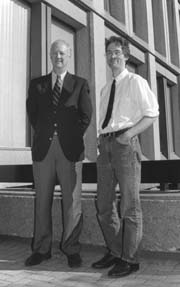
| ||
 | ||
 Professors Paul Noble and Rex Brynen PHOTO: PETER KADELBACH |
Can things change in the Middle East?
|
TOD HOFFMAN | The relative ease with which the entrenched Communist governments of Eastern Europe were brought down caused political scholars to contemplate the immense potential of change. Suddenly, it became reasonable to analyze the conditions that might fell other, seemingly immovable, regimes in other regions.
This was the inspiration behind a conference sponsored in the spring of 1993 by the Inter-University Consortium for Arab Studies (ICAS), which has culminated with the recent publication of the second of two volumes on Political Liberalization and Democratization in the Arab World. The books were edited jointly by conference organizers and ICAS members, Professors Paul Noble and Rex Brynen of McGill's Department of Political Science, and political science professor Bahgat Korany of the Université de Montréal. Five years ago, according to Brynen, there were indications that domestic and foreign conditions across the Arab world might compel authoritarian rulers to succumb to the international trend toward democratization and liberalization. He cites, for example, the advent of elected Parliaments in Jordan, Kuwait and Morocco. While conceding that they're subservient to the monarchy, in all three cases the bodies conduct meaningful debate. Furthermore, Yemen underwent reform with reunification of the north and south in 1990 and the end of the Lebanese civil war brought with it a re-establishment of constitutional order. However, he cautions, "I don't think there's much prospect for a dramatic transition à la Eastern Europe. "The regimes are too entrenched, there are few alternatives, and they inhabit a dangerous neighbourhood which, in itself, militarizes politics and breeds authoritarian rulers." What Brynen rejects is the idea that there's something inherent in Arab or Islamic culture that predisposes them to accept authoritarian rule. "There's almost nothing I feel compelled to explain with Islam. It's the political and economic structures that affect conditions," he argues. "Religion has been appropriated in the same way nationalism has been used in conflicts the world over. It's a mantle that incorporates powerful symbolism and allows a group to readily distinguish itself from its opposition." Noble backs this sentiment. "There seemed to be a strong sense among analysts that the Arab world was somehow unique, that it acted outside the theoretical mainstream," he notes. "One of the goals of ICAS is to apply the concepts of comparative politics and international relations to the area and explore the regularities and differences that emerge." Periods of flux are notoriously unstable. Add to that the generally high level of conflict in the region and its volatility becomes painfully obvious. "Threat of foreign conflict can put across the idea that an authoritarian regime is necessary," Noble asserts. ICAS, which was established in 1989 to encourage study into the multitude of security threats in the Arab world -- its first book was The Many Faces of National Security in the Arab World -- will continue to explore internal and external factors affecting the region. The next major thematic question it will take up relates to the foreign policies of Arab states and emergent strategies for coping with change. To these issues Noble, acting director of ICAS, brings his expertise in the international politics of the Middle East. Brynen, ICAS research coordinator, contributes his interest in peace building and post-conflict reconstruction. At the same time, ICAS is deeply involved in the study of Palestinian refugee questions. It maintains the Internet web sites for the Palestine Refugee Research Net, the Palestinian Development Info-Net, and the United Nations Special Coordinator in the Occupied Territories. More generally, it serves as an international network for students of the Arab world through its e-mail list. Thanks in large part to ICAS, along with the Middle East Studies Program, of which Noble is director, and the Institute for Islamic Studies, McGill has emerged as a leading centre for studies in Middle East politics, development and culture.
|
|
| |||||